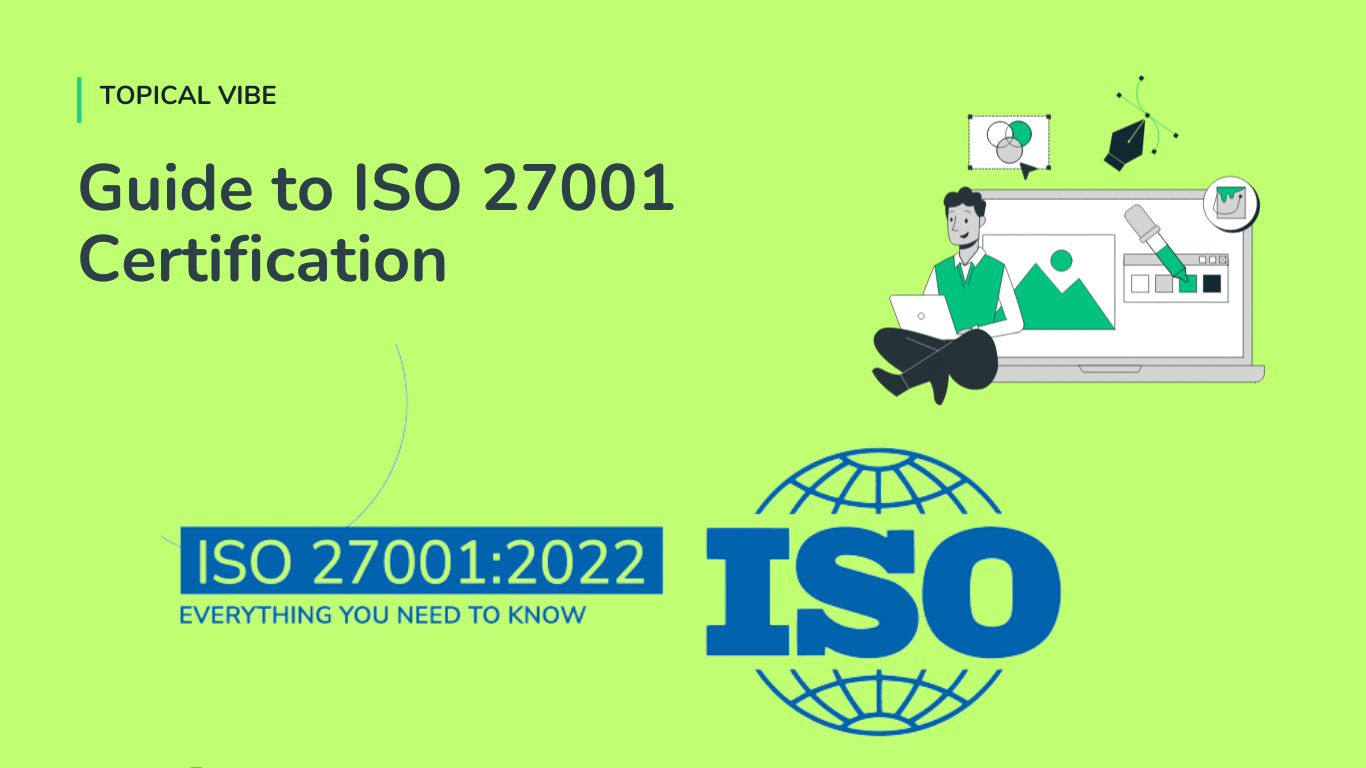A Comprehensive Guide to ISO 27001 Certification

19 August 2023
Welcome to the world of ISO 27001 certification, where safeguarding your organization’s information is taken to a whole new level! In today’s digitally-driven age, data security has become a top priority for businesses across all industries. That’s why obtaining ISO 27001 certification can be a game-changer for your company. But what exactly does it entail? And how can you navigate through the certification process successfully? We’ve got you covered with this comprehensive guide that will demystify all things ISO 27001 certification and help you embark on the path to becoming certified. So, fasten your seatbelts as we dive into the exciting realm of ISO 27001 certification and uncover its benefits, steps involved in the process, and how to maintain your hard-earned certification. Let’s get started!
What is ISO 27001 Certification?
ISO 27001 certification is an internationally recognized standard that sets out the requirements for establishing, implementing, maintaining, and continually improving an Information Security Management System (ISMS). But what does this mean exactly?
At its core, ISO 27001 certification helps organizations protect their valuable information assets from unauthorized access, disclosure, alteration, or destruction. It provides a systematic approach to managing sensitive data by identifying risks and implementing controls to mitigate them effectively.
By achieving ISO 27001 certification, businesses demonstrate their commitment to ensuring the confidentiality, integrity, and availability of information within their organization. This not only enhances customer trust but also gives stakeholders confidence in your ability to handle sensitive data securely.
ISO 27001 covers various aspects of information security management such as risk assessment and treatment processes, incident management procedures, employee awareness programs, and regular audits. It ensures that organizations have robust policies and procedures in place to safeguard against potential threats.
Implementing ISO 27001 requires a comprehensive understanding of your organization’s information security needs along with a strong commitment from top-level management. It involves conducting a thorough risk assessment exercise to identify vulnerabilities and determine appropriate controls.
In summary,
ISO 27001 certification is all about taking proactive measures to protect your organization’s valuable information assets while demonstrating credibility in the eyes of clients and stakeholders alike. With stringent requirements for implementation and maintenance of an ISMS framework tailored specifically for your business needs – it’s time to make information security a priority!
The Benefits of ISO 27001 Certification
ISO 27001 Certification offers numerous benefits for organizations looking to enhance their information security practices. Certification demonstrates that an organization has implemented a robust and effective information security management system (ISMS) based on international best practices. This can give clients, partners, and stakeholders confidence in the organization’s ability to protect sensitive data.
ISO 27001 Certification helps organizations comply with legal and regulatory requirements related to information security. By implementing the necessary controls outlined in the standard, organizations can ensure they meet industry-specific regulations and avoid potential fines or legal consequences.
ISO 27001 Certification enhances risk management capabilities by identifying and mitigating potential threats to information assets. Through regular risk assessments and ongoing improvement processes, organizations can proactively address vulnerabilities and reduce the likelihood of security incidents or breaches.
Additionally, certification fosters a culture of continuous improvement within an organization. By adhering to ISO 27001 standards and regularly reviewing policies and procedures, organizations can identify areas for enhancement and implement measures to strengthen their overall security posture.
Furthermore, ISO 27001 Certification provides a competitive advantage by demonstrating commitment to protecting customer data. In today’s digital landscape where data breaches are prevalent, having this certification sets businesses apart from competitors who may not have invested in robust information security measures.
Achieving ISO 27001 Certification promotes trust among customers who value strong data protection measures when deciding which vendors or service providers to engage with. It gives them assurance that their sensitive information will be safeguarded while conducting business transactions with certified organizations.
Obtaining ISO 27001 Certification brings significant advantages such as increased credibility among stakeholders; compliance with legal requirements; improved risk management; fostering continuous improvement; gaining a competitive edge; as well as establishing trust with customers concerned about data protection.
How to Get ISO 27001 Certified
Getting ISO 27001 certified is a significant achievement for any organization looking to enhance its information security management system. But how exactly do you go about obtaining this certification? Let’s break it down into a few key steps.
You need to establish your objectives and scope of the certification. Determine which parts of your organization will be covered by the ISO 27001 standard and set clear goals for achieving compliance.
Next, conduct a thorough risk assessment to identify potential vulnerabilities in your information security infrastructure. This step is crucial as it helps you prioritize areas that require improvement or additional safeguards.
Once you have identified these gaps, develop and implement effective controls to mitigate risks. These controls should align with the requirements outlined in ISO 27001.
After implementing the necessary controls, document all relevant policies and procedures in an Information Security Management System (ISMS) manual. This manual serves as a comprehensive guide for employees on how to handle sensitive information securely.
Conduct internal audits regularly to assess the effectiveness of your ISMS and ensure ongoing compliance with ISO 27001 standards. It’s essential to address any non-conformities promptly and take corrective actions where necessary.
Engage an accredited certification body to perform an external audit of your ISMS. They will evaluate whether your organization meets all the requirements outlined in ISO 27001 and determine if you are eligible for certification.
Remember, achieving ISO 27001 certification requires dedication, commitment, and continuous improvement. By following these steps diligently, you can position yourself as a trusted guardian of information security within your industry
The Steps Involved in the Certification Process
Define your scope and objectives: Before you begin the certification process, it’s important to clearly define the scope of your information security management system (ISMS) and outline your objectives. This will help guide you throughout the certification journey.
- Conduct a gap analysis: Next, conduct a thorough assessment of your current security measures against the requirements of ISO 27001. Identify any gaps or areas for improvement that need to be addressed before proceeding further.
- Develop an implementation plan: Once you have identified the gaps, create a detailed plan outlining how you will address each one. This may involve implementing new policies and procedures, conducting employee training, or deploying additional security controls.
- Implement necessary changes: With your plan in place, start implementing the necessary changes within your organization. This could include updating existing processes, upgrading technology systems, or improving physical security measures.
- Perform internal audits: Regularly perform internal audits to ensure that your ISMS is functioning effectively and meeting all relevant requirements of ISO 27001. These audits should be conducted by qualified personnel who are independent from those responsible for managing daily operations.
- Engage an accredited certification body: Once you are confident in the effectiveness of your ISMS, engage an accredited certification body to conduct an external audit and verify compliance with ISO 27001 standards.
- External audit and certification decision: The certification body will assess whether your organization meets all applicable requirements during their external audit process. Based on their findings, they will make a decision regarding whether to award you with ISO 27001 certification or not.
- Maintain continuous improvement: Achieving ISO 27001 certification is not just a one-time achievement; it requires ongoing commitment to maintaining high levels of information security management within your organization.
What Happens After Certification?
After achieving ISO 27001 certification, your organization enters a new phase of its information security journey. You have successfully demonstrated compliance with the international standard and established robust processes and controls to protect your valuable data. But what happens next?
You can proudly display the ISO 27001 certification logo on your website, marketing materials, and communications. This badge of honor not only enhances your reputation but also provides assurance to stakeholders that you prioritize information security.
Additionally, maintaining ongoing compliance is crucial. Regular surveillance audits will be conducted by an accredited certification body to ensure continued adherence to the standard’s requirements. These audits serve as an opportunity for improvement, enabling you to identify any weaknesses or areas for enhancement in your information security management system.
Furthermore, staying up-to-date with changes in technology and evolving threats is essential. Regular risk assessments will help you identify emerging risks and implement appropriate measures to address them proactively.
Moreover, engaging employees through training programs and awareness campaigns ensures that everyone remains vigilant about their responsibilities towards safeguarding sensitive information.
Continuous improvement should be ingrained within your organization’s culture. By regularly reviewing performance metrics and seeking feedback from customers and employees alike, you can identify opportunities for innovation and refinement in your information security practices.
In conclusion,
achieving ISO 27001 certification is just the beginning of a long-term commitment to protecting sensitive data. By embracing ongoing compliance efforts, adapting to evolving risks, and fostering a culture of continuous improvement, you can reinforce trust among stakeholders and maintain robust information security practices well into the future
Maintaining Your ISO 27001 Certification
Once you have achieved ISO 27001 certification, the journey doesn’t end there. Maintaining your certification is just as important as obtaining it in the first place. It shows your commitment to continuously improving and upholding information security standards within your organization.
To maintain your ISO 27001 certification, regular assessments and audits are necessary. This ensures that you are consistently meeting the requirements of the standard and effectively managing risks associated with information security.
One crucial aspect of maintaining your certification is conducting internal audits. These audits help identify any gaps or areas for improvement in your information security management system (ISMS). By regularly reviewing and assessing your ISMS, you can address any weaknesses and make necessary adjustments to stay compliant with ISO 27001.
Another essential element of maintenance is ongoing training and awareness programs for employees. Ensuring that everyone in your organization understands their roles and responsibilities when it comes to information security helps create a culture of vigilance.
Regularly reviewing policies, procedures, and controls is also vital for maintaining compliance with ISO 27001. As technology evolves, new threats emerge, so it’s crucial to keep these documents up-to-date to address emerging risks adequately.
Additionally, monitoring key performance indicators related to information security can provide valuable insights into how well you’re meeting objectives set out by ISO 27001. This data-driven approach allows you to identify trends or areas where improvements may be needed promptly.
Remember that maintaining ISO 27001 certification requires ongoing dedication from all levels of an organization. By staying proactive in addressing potential risks and continually improving processes, you can ensure that your information assets remain secure over time
Conclusion
Achieving ISO 27001 certification is a significant accomplishment for any organization. It demonstrates your commitment to information security and provides assurance that you have implemented the necessary controls to protect sensitive data.
By undergoing the certification process, you can reap numerous benefits, including increased customer trust, improved internal processes, and enhanced risk management capabilities. The steps involved in obtaining ISO 27001 certification may seem daunting at first, but with careful planning and dedication, it is an achievable goal.
Remember that certification is not a one-time event—the real work begins after receiving the certificate. Ongoing maintenance and continual improvement are essential for maintaining compliance with ISO 27001 standards. Regular audits will help identify areas for improvement and ensure your organization stays on track.
In today’s increasingly digital world, information security is crucial. Obtaining ISO 27001 certification sets your organization apart from competitors by demonstrating your commitment to protecting valuable data assets.
So why wait? Start exploring the steps to become ISO 27001 certified today and give your business a competitive edge while gaining peace of mind knowing that you have robust security measures in place. Protecting sensitive information has never been more important than it is right now!





